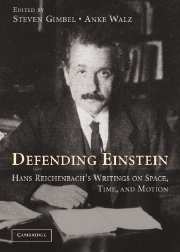Book contents
- Frontmatter
- Contents
- Introduction
- 1 Review of Moritz Schlick's General Theory of Knowledge
- 2 Einstein's Theory of Space
- 3 Reply to H. Dingler's Critique of the Theory of Relativity
- 4 A Report on an Axiomatization of Einstein's Theory of Space-Time
- 5 Reply to Th. Wulf's Objections to the General Theory of Relativity
- 6 Einstein's Theory of Motion
- 7 The Theory of Relativity and Absolute Transport Time
- 8 Reply to Anderson's Objections to the General Theory of Relativity
- 9 Review of Aloys Müller's The Philosophical Problems with Einstein's Theory of Relativity
- 10 The Philosophical Significance of the Theory of Relativity
- 11 Planet Clocks and Einsteinian Simultaneity
- 12 On the Physical Consequences of the Axiomatization of Relativity
- 13 Has the Theory of Relativity Been Refuted?
- 14 Response to a Publication of Mr. Hj. Mellin
- Index
9 - Review of Aloys Müller's The Philosophical Problems with Einstein's Theory of Relativity
Published online by Cambridge University Press: 09 November 2009
- Frontmatter
- Contents
- Introduction
- 1 Review of Moritz Schlick's General Theory of Knowledge
- 2 Einstein's Theory of Space
- 3 Reply to H. Dingler's Critique of the Theory of Relativity
- 4 A Report on an Axiomatization of Einstein's Theory of Space-Time
- 5 Reply to Th. Wulf's Objections to the General Theory of Relativity
- 6 Einstein's Theory of Motion
- 7 The Theory of Relativity and Absolute Transport Time
- 8 Reply to Anderson's Objections to the General Theory of Relativity
- 9 Review of Aloys Müller's The Philosophical Problems with Einstein's Theory of Relativity
- 10 The Philosophical Significance of the Theory of Relativity
- 11 Planet Clocks and Einsteinian Simultaneity
- 12 On the Physical Consequences of the Axiomatization of Relativity
- 13 Has the Theory of Relativity Been Refuted?
- 14 Response to a Publication of Mr. Hj. Mellin
- Index
Summary
Braunsweig, Fr. Vieweg & Son, 1922. VIII, 224 pages and 10 illustrations. 8o. Price, M. 7,50 stapled and M. 9,25 bound.
A comprehensive work that sets out the philosophical problems of the theory of relativity in detail would be a true enrichment of the literature. Unfortunately, Müller's volume contains mistakes. It distinguishes itself by committing these errors in a very dull and matter-of-fact way and not in the usual emotion-laden warlike fashion of most of Einstein's opponents – yet it is built on an entirely flawed understanding of the special theory of relativity that results in faulty conclusions. A necessary prerequisite for any philosophical critique of relativity is an analysis of the theory's factual basis and conceptual foundation; and Müller's efforts are frustrated by the inability to offer such an analysis. His first mistake concerns the concept of simultaneity. He claims that simultaneity can be known and does not need to be defined. He fails to grasp that there are two types of definitions: the definition of concepts within a conceptual system and “coordinative definitions” which specify how given concepts acquire an empirical reality. Thereby, a conceptual definition is posited for a unit length; but in order to actually carry out measurements a coordinative definition must be put in place to fix that “this rod here” is a unit long.
- Type
- Chapter
- Information
- Defending EinsteinHans Reichenbach's Writings on Space, Time and Motion, pp. 91 - 94Publisher: Cambridge University PressPrint publication year: 2006



